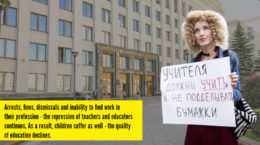Unfortunately, attempts to commit an act of self-immolation in independent Belarus were not uncommon. However, suicides used to set themselves on fire in their own house or in the forest, away from people – and they often managed to be saved.
High-profile cases of self-immolation attempts precisely as a sign of protest from 1998 to 2021 happened several times. However, in the post-election period (after August 9), the number of self-immolations as protest actions increased. The reasons in each case are always the same – disagreement with the mayhem and lawlessness of the authorities.
Details of the acts of self-immolation in independent Belarus can be found below.
The first self-immolation in independent Belarus took place in Navapolatsk. On July 8, 1998, local lawyer Alexei Filipchenko walked out of the courthouse and doused himself with gasoline and then set himself on fire with a match. Prior to that, Filipchenko was in charge of the case of pensioner Alevtina Voronova, who for several years shared her apartment with a stranger who did not pay for utilities. The court did not satisfy her claim to return her square meters, and she turned to Filipchenko. As a sign of protest, they locked themselves in the apartment and did not allow anyone there, for which they were tried on July 8, 1998. During the trial, Voronova lost consciousness and was taken to the hospital, and Filipchenko, seeing this, took out a three-liter can of gasoline and committed an act of self-immolation. Doctors reported burns to 80 percent of the body. Alexey Filipchenko died on July 31, 1998 from the received injuries[1].
On November 24, 2011, the news of the attempted self-immolation came from the penal colony in Ivatsevichi. A prisoner, a disabled person of the 2nd group, Vladimir Obukhovsky, poured flammable liquid on himself and set it on fire. They managed to extinguish him and took him to the hospital with burns. According to rumors, this was preceded by problems with the administration of the colony. The inmate was admitted to intensive care with burns of 30 percent of his skin[2].
On the morning of June 9, 2017, a 55-year-old employee of Komintern OJSC, located in Homel, poured flammable liquid on herself and set herself on fire at the entrance of the enterprise. Before the act of self-immolation, the woman said that she had “stolen 18 years of experience.” The company confirmed that the Gomel woman was engaged in registration of her pension. From Russia, where she worked for a long time, the necessary documents for applying for a pension did not come. The flames were extinguished by workers who were repairing the turnstile at the entrance. The victim was diagnosed with burns of 50 percent of the body[3]. On June 18, it became known that she died in hospital[4].
On Saturday, September 19, 2020, an act of self-immolation took place in Smolevichi. A 36-year-old resident of the village of Zadomlya, Smolevichi district, came to the building of the Smolevichi police office, poured gasoline on himself and set it on fire. Police officers were able to put it out. Prior to that, the man had been repeatedly detained and, possibly, tortured in this police office. It is known that before this act of self-immolation, the man several times called the police office and threatened to commit suicide. After the act of self-immolation, he was taken to the hospital, where he was diagnosed with burns on 84 percent of his body, including the respiratory tract[5]. On September 25, a man died at the Republican Burn Center.
On January 22, 2021, a self-immolation attempt took place near the Government House in Minsk. A 35-year-old resident of Minsk, Paval Bankousky, doused himself with flammable liquid and set himself on fire. The flames were extinguished by guards from Government House. Then the victim was taken to the Republican Burn Center – more than 50 percent of his body was burned. It is known that Paval worked as a trolleybus driver, and in his free time he was engaged in reconstruction in the knightly club “Snow Leopard”, was fond of the history of the Grand Duchy of Lithuania, participated in street actions in the 2000s, supported the Zubr movement[6].
[1]https://history.nn.by/?c=ar&i=224158&lang=ru
[2]https://news.tut.by/society/260943.html
[3]https://news.tut.by/accidents/546681.html
[4]https://news.tut.by/society/547904.html
[5]https://news.tut.by/accidents/700984.html
[6]https://nn.by/?c=ar&i=267082&lang=ru







